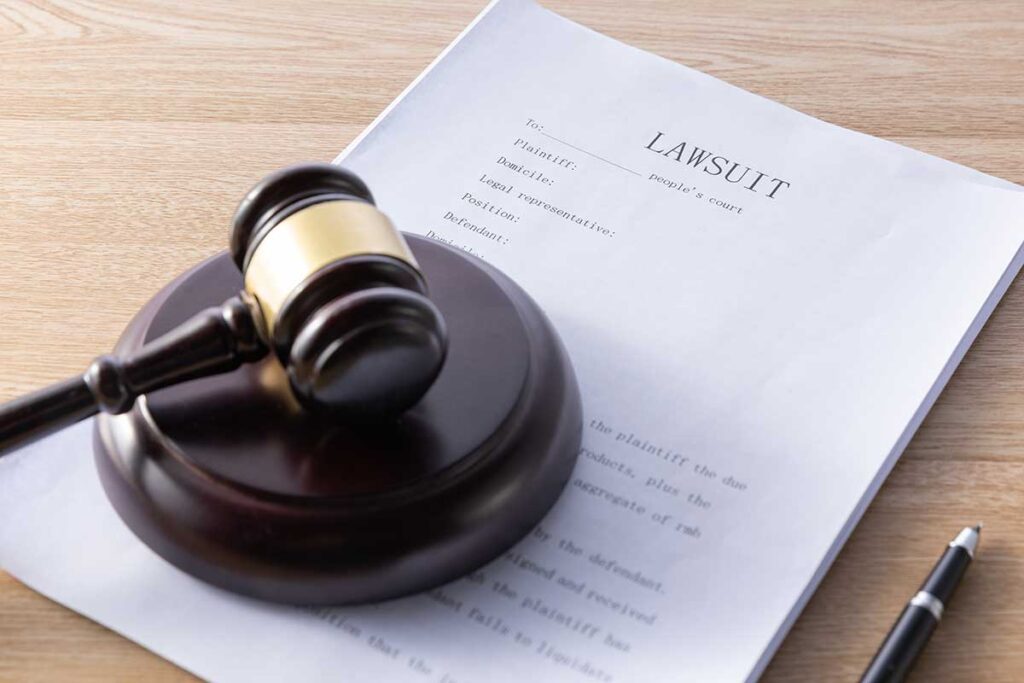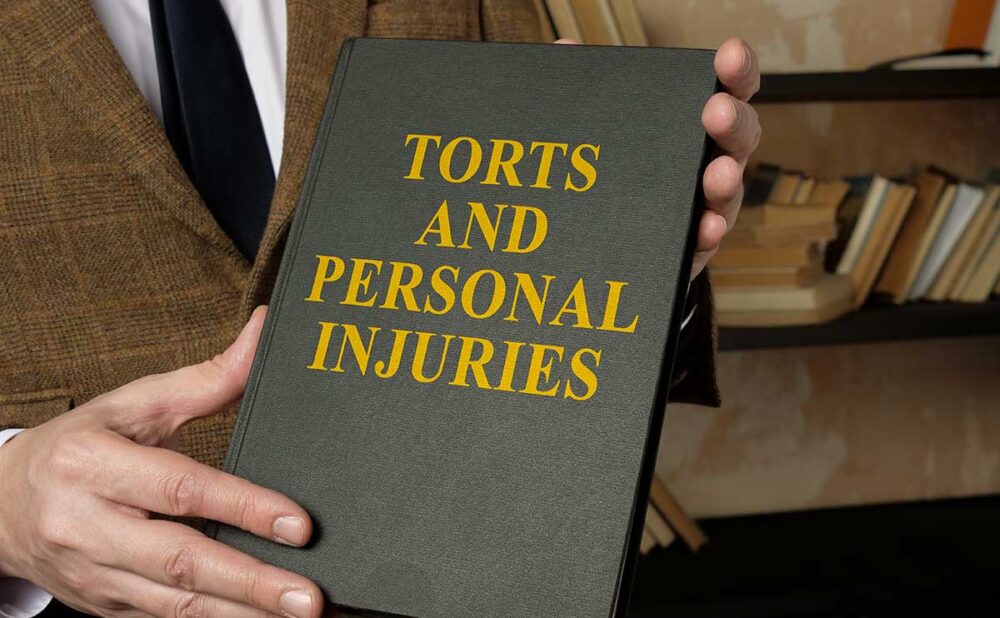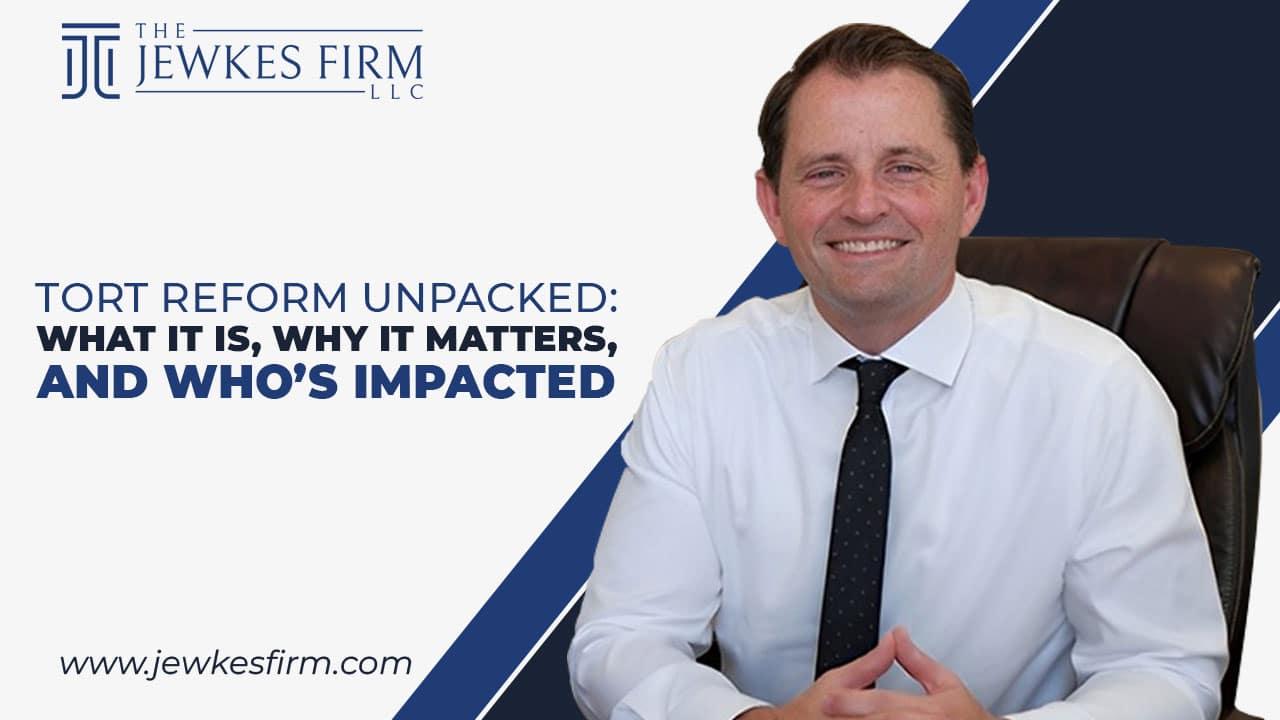The Dangers of Tort Reform in Georgia: Protecting the Rights of Injury Victims
Individuals injured by negligence or misconduct can seek justice and compensation through tort law. In Georgia, recent proposals for tort reform—specifically caps on damages in personal injury cases—could have significant consequences for victims who rely on the legal system to help them recover physically, emotionally, and financially. In theory, the goal of tort reform is to make the legal system more efficient and reduce excessive lawsuits. However, the potential impact on individuals who suffer serious injuries is deeply concerning.
At The Jewkes Law Firm, we believe it’s crucial for Georgians to be well-informed about the proposed changes that may significantly impact their ability to seek compensation after an accident.
The Landscape of Tort Reform
Tort, in simple terms, refers to a wrongful act that leads to civil liability, which is particularly relevant in cases of personal injury. The impending reforms may introduce various restrictions on premises liability lawsuits, among other modifications that could potentially complicate the pursuit of rightful compensation for injury victims. Georgia individuals must stay informed as these changes could significantly alter how personal injury claims are filed and adjudicated.
Tort Reform Is Bad News
Despite what the big insurance machine wants you to believe, tort reform is bad news. Tort reform is government overreach in its purest form.
With little factual support, Marc Hyden, a columnist for the Newnan Times-Herad, recently claimed that tort reform is “overdue” because of rampant court “abuse” and “nuclear” verdicts. He also claimed injury suits cost the state 120,000 jobs per year and suggested Georgians pay a “tort” tax of $1,200 a year as a result. Really? Nothing could be further from the truth.
Unfounded Claims at the Expense of Civil Rights
Marc Hyden’s claims on tort reform lack factual support and transparency. Let’s examine Mr. Hyden’s bias. Marc Hyden is the Director of State Government Affairs at the R Street Institute. His employer, a Washington DC-based think tank, is backed by big insurance, revealing a conflict of interest. He also failed to disclose that the American Tort Reform Association has been backed by big tobacco, big pharma, and big insurance for the past 30 years. Big insurance teaming up with big pharma and big tobacco? What could possibly go wrong?
Tort reform primarily aims to limit jury trials, benefiting insurers and corporations at the expense of civil rights. Despite claims that tort reform leads to lower insurance premiums, studies show that premiums have risen in states with such reforms. Additionally, Hyden’s assertion that large jury awards are common is misleading. Georgia has seen fewer than 40 awards of $10 million or more in six years. He is spreading unfounded claims of job loss and a “tort” tax to instill fear.
As a trial attorney with experience on both sides, Jordan Jewkes has seen how insurance companies prioritize litigation costs over fair compensation for injury victims. Jordan opposes government overreach, including restrictions on the right to a jury trial, which is essential for holding corporations accountable. The push for tort reform primarily benefits big insurance, tobacco, and pharma, not citizens.
Who’s Pushing for Tort Reform?
Tort reform isn’t just a legal issue—it’s a battle driven by powerful players who want to limit lawsuits and reduce compensation for victims. So, who’s behind the push?
- Big Corporations – Companies facing lawsuits (like insurance, pharmaceutical, and manufacturing giants) advocate for stricter liability laws to reduce payouts.
- Insurance Companies – They claim that lawsuits drive up premiums, pushing for caps on damages to protect their profits.
- Lobbyists and Special Interest Groups – Organizations like the U.S. Chamber of Commerce
Tort reform is back in Georgia (sort of) and long overdue by Marc Hyden
Retrieved September 9, 2024, from https://www.times-herald.com/opinion/tort-reform-is-back-in-georgia-sort-of-and-long-overdue/article_753996ac-6ef9-11ef-8eb3-d3421e109934.html
Tort Reform Is Bad News by Attorney Jordan Jewkes
Retrieved September 12, 2024, from https://www.times-herald.com/opinion/tort-reform-is-bad-news/article_261430e6-7133-11ef-90a0-d342b8a4a4f8.html


Potential Impacts on Injury Victims
As the legislative landscape shifts, injury victims may encounter a range of challenges stemming from these proposed changes. For instance, prohibiting direct action lawsuits could leave victims without sufficient financial recourse when at-fault parties are unable to provide adequate compensation. The potential impacts may include:
- Inability to sue insurers and trucking companies simultaneously. This could severely limit the avenues through which victims can seek justice and compensation.
- Challenges in suing property owners for premises liability. Restrictions may hinder a victim’s ability to hold property owners accountable for unsafe conditions.
- Limits on defective product lawsuits. Stricter regulations may make it more difficult for individuals injured by faulty products to pursue claims.
- Caps on damages. Imposing limits on compensation could diminish the financial recovery available to victims suffering from severe injuries.
- Increased obstacles in seeking damages for car accidents, medical malpractice, wrongful death, and other torts. These changes could lead to prolonged legal battles and diminished outcomes for plaintiffs.
Limited Compensation for Serious Injuries
Personal injury cases often involve more than just medical bills—they encompass the full range of consequences that a person suffers as a result of an accident or wrongdoing. For victims, non-economic damages, such as pain and suffering, loss of enjoyment of life, and emotional distress, are critical components of compensation. These damages help address the profound impact that a severe injury can have on a person’s life.
Tort reform proposals that cap non-economic damages threaten to minimize the full extent of an injury. For many victims, especially those who suffer long-term or permanent injuries, the financial relief from these damages is essential not only for recovery but for rebuilding their lives. When the law limits how much victims can recover, it leaves them vulnerable to the lasting consequences of their injuries without adequate compensation to cover the costs of ongoing care, therapy, or lost opportunities.
Decreased Accountability for Negligent Parties
Tort law helps ensure that those who cause harm—whether through reckless driving, medical malpractice, or dangerous products—are held accountable for their actions. When businesses, manufacturers, or individuals know that they may face significant financial liability for their actions, they are more likely to take preventive measures to avoid accidents and ensure safety.
However, capping damages limits the potential consequences for negligent behavior. If businesses are less likely to face substantial financial penalties, they may have less incentive to prioritize safety protocols, potentially leading to more injuries and accidents. Without strong accountability, there is less motivation to prevent harm before it occurs, which ultimately affects the safety of the general public.
Barriers to Accessing Legal Representation
Tort reform often includes restrictions on attorney fees, which could discourage lawyers from taking on personal injury cases, particularly for individuals with more complex or severe injuries. For many injury victims, the financial burden of a serious injury—combined with medical bills, rehabilitation costs, and lost wages—can make it difficult to afford legal services. Capping or limiting attorney fees may make it harder for individuals to find skilled legal representation. This is particularly relevant if their case requires significant time and resources.
This could disproportionately affect those who need legal help the most—victims of catastrophic injuries who require extensive support to navigate their claims. Without the right legal team in place, many victims could be left with inadequate settlements or no recourse at all.
Shifting the Financial Burden
Injury victims often face lifelong costs, including medical treatments, rehabilitation, and possibly permanent disability support. When tort reform limits compensation, this burden doesn’t disappear; instead, it often shifts to taxpayers and public healthcare programs. Government programs like Medicaid and Social Security Disability Insurance (SSDI) may become the primary source of support for these individuals, leading to increased taxpayer costs and less financial relief for the victims themselves.
This shift may also have long-term economic implications for communities. By limiting the ability of individuals to recover compensation from negligent parties, tort reform could place a greater strain on public services and resources, which may have otherwise been used to support other vital needs in society.
Tort Reform Impact on Vulnerable Populations
Tort reform proposals often disproportionately affect vulnerable groups, including the elderly, low-income individuals, and those with pre-existing medical conditions. These populations tend to face higher risks of injury and, in many cases, may not have the financial means to pursue lengthy or expensive legal battles. Limiting their ability to recover full compensation further exacerbates the inequities they already face, leaving them with fewer resources to address the financial and personal impact of an injury.
For these individuals, tort reform can effectively strip away their ability to seek meaningful justice and recovery, leaving them with diminished access to both the legal system and the resources they need to rebuild their lives.
Key Takeaways on Tort Reform
- Corporate Influence and Bias. Large insurance companies, like the R Street Institute and the American Tort Reform Association, influence the claims made by proponents of tort reform.
- Threat to Civil Rights. Critics argue that tort reform restricts the right to jury trials. This fundamental civil liberty is essential for holding corporations and the government accountable.
- Insurance Premiums Unaffected by Reform. Significant tort reform has not led to lower insurance premiums in states like Florida and Texas; in fact, studies indicate that premiums have risen in states with tort reform, suggesting that insurance companies benefit financially regardless of these changes.
- Misrepresentation of Jury Awards. The assertion that large jury awards are common is misleading; there have been very few substantial awards in Georgia, indicating that such claims are exaggerated.
- Fabricated Claims of Economic Impact. Allegations regarding job losses and a proposed “tort tax” are dismissed as unfounded scare tactics created by the insurance industry to manipulate public perception and influence legislation.

GEORGIA PERSONAL INJURY LAWYER NEAR ME
Achieve Justice with The Jewkes Law Firm
In light of potential new restrictions resulting from Georgia’s tort reform, The Jewkes Law Firm stands ready to provide the essential legal support that injury victims need. Our team offers compassionate and effective counsel, guiding you through the intricacies of personal injury law to help you recover from injuries and secure a brighter future.
Whether you’ve been involved in a car crash, a slip and fall incident, or any other type of accident, our dedicated attorneys are here to assist you in pursuing a fair settlement or court verdict. We invite you to schedule a free consultation with one of our attorneys to gain a clearer understanding of your rights and to kickstart your case.
Call us today at (770) 771-5130 to schedule your free consultation and learn more about your legal options. At The Jewkes Firm, we are your steadfast advocates in the fight for the compensation you deserve. Together, we can navigate the complexities of Georgia’s personal injury law and work toward achieving the justice you seek.






